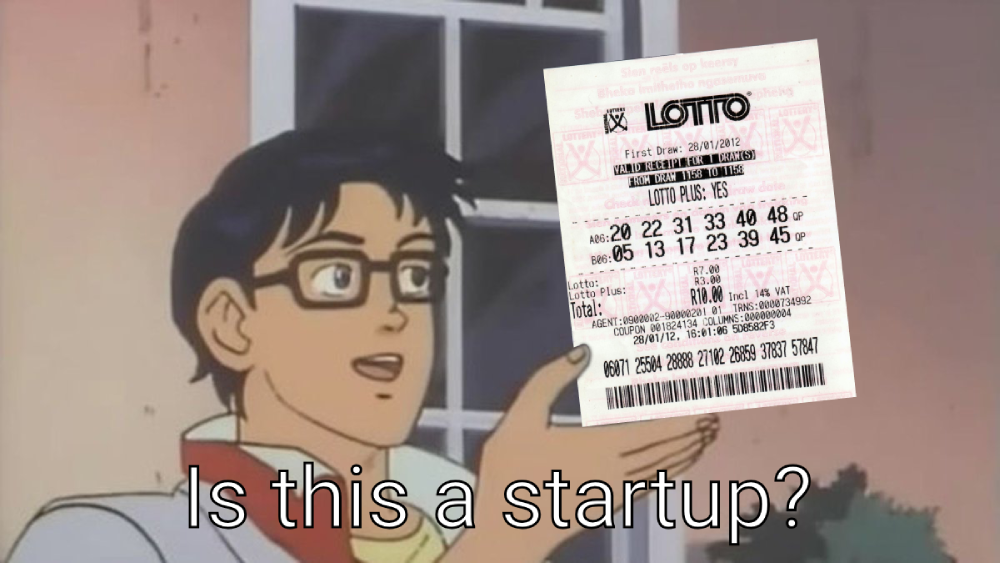Startups Are Not Lottery Tickets
August 17, 2024
A side project won't become a unicorn by accident. Stop imagining yours will.

We are all familiar with the lottery ticket nature of startups. If your startup has the right tech, the right audience, the right people, the right timing, etc etc, … you might hit it big and become a multi-million or even multi-billion dollar company. The initial investors, c-suite, and founding engineers make a fuck ton of money and everybody rides off into the sunset on the back of the unicorn. If however the startup fails (which is by far the most common result) then everybody packs up and tries again on the next one. There are huge rewards for the winners while the losers get little more than some experience and a conversation starter for their resume.
I'd like to talk about this perspective as a founder of several startups. While it can be applicable to employees (and I am an employee of a startup), I'm focusing primarily on the founder's experience here. In particular I'm speaking to the experience of software engineers who start a side project while maintaining a full time job. In my experiences doing just that, I've finally realized that as a founder I have treated each side-project-startup like a lottery ticket. I invest my time and energy into them with the reservations of someone who is leery of the gamble. I don't allow my startups to be too important to me because if (when) they fail no big deal, it's just a lottery ticket! If it happens to explode in popularity then great, I win. If it doesn't… who cares?
I am an optimist. I will occasionally buy a lottery ticket because there's a part of me that goes "ooh, but what if" and I give into that. I am a realist. When I buy a lottery ticket I roll my eyes a little bit and know that my odds of winning the big prize are virtually nil, so I don't really spend more than a couple bucks on it every few months or so. I have never won the lottery. I doubt that I ever will.
If I buy a lottery ticket with the expectation of losing, won't my projects suffer the same fate when I work on them with that mindset?
So far… yes.
A Case Study: Formcake
Formcake was a platform for handling POSTs from html forms. Its primary use case was connecting your form's submission data to you without writing any more code than <form target="https://formcake.com">. It was particularly useful for any static site that needed a contact form. Three of my friends and I worked on it for about four years. A few weeks ago we shut it down. We failed.
I failed.
This is not the first time I've failed. I have a long list of side projects over the past decade that have all ended more or less ignominiously. However, this one hurt and it hurt because I believed that Formcake had promise. Hell, I still believe that.
There are a litany of reasons why Formcake died… poor marketing, lack of focused product niche, scammers abusing the platform (a surprisingly pervasive problem that attracted attention from government agencies across the world), lack of integrations, and a lack of interest from its creators. Yet despite all those issues we had a core group of users who liked the product and used it religiously, myself included.
There were many things we could have done to turn Formcake into a success. I won't speak for the other founders, but for myself, by the end I couldn't bring myself to do that work because I had firmly placed Formcake into lottery ticket status. Fixing any of its issues required significantly more work than a lottery ticket deserves. To be honest, I hadn't even realized that I was thinking about it that way until after we had shut off the servers.
Consider marketing. I would need to build out social media presences on at least one platform, probably several. I would need to spend some money on targeted ads. I might have to hire someone to write copy and build out a marketing strategy. No way am I doing any of that for a lottery ticket.
Consider scammers. We could do some naive testing against submission data and flag anything with the word "password" in it for review. We could have thrown sampled data at some AI service and asked it if it looked like phishing (I actually did this a little bit manually and it was detecting phishing submissions surprisingly accurately). Guess who's not doing that work for a lottery ticket.
And on and on and on.
Mindset Shift: You Don't Have to Build a Unicorn
Startups do not just magically become unicorns. They're not actually lottery tickets. If you want to build a company that looks like a lottery ticket to the outside world, you have to invest a huge amount of time and energy in it. Like, a staggering amount. Imagining your side-project-startup will become a unicorn is like expecting to have a bodybuilder's body because you did one pullup last Tuesday. In my professional life I have worked for companies that have unicorn status as a stated goal. It is a full time job for many people across many disciplines. It's exhilarating work and I love it… but it's not easy, it's not accidental, and it's really not luck.
I do not have the time, energy, or skill to build a unicorn as a side project.
Holy shit! I don't have the time to build a unicorn! Why am I worrying about unicorn problems? I am not making something that will turn into a lottery ticket, and I am not making something that might one day be worth a billion dollars. I'm not! I want to make useful tools that solve problems for real people while making a few bucks. I don't need millions, I just want vacation money, you know?
For the software engineers who are making things on the side please consider this: we often put "startup" on a pedestal and associate it with everything Silicon Valley. I know I did. Even when my stated goal was "make a bootstrapped startup" I had an idealized version of what a "startup" was in my head. I also had a naive idea of what it took to win the lottery of startups. I adjusted the level of effort I put into things based on these ideas and it has killed my projects over and over and over.
I'm going to make more things. It is fun, satisfying, and fulfilling to create. But this time, next time, I won't let it be a lottery ticket.
Stop 👏 treating 👏 startups 👏 like 👏 lottery 👏 tickets
Blog
